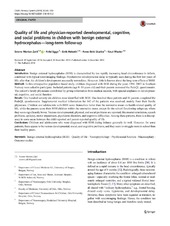Quality of life and physician-reported developmental, cognitive, and social problems in children with benign external hydrocephalus—long-term follow-up
Peer reviewed, Journal article
Published version

Åpne
Permanent lenke
https://hdl.handle.net/1956/19793Utgivelsesdato
2019-02Metadata
Vis full innførselSamlinger
Originalversjon
Child's Nervous System. 2019;35(2):245–250 https://doi.org/10.1007/s00381-018-4016-2Sammendrag
Introduction: Benign external hydrocephalus (BEH) is characterized by too rapidly increasing head circumference in infants, combined with typical neuroimaging findings. Psychomotor developmental delay is typically seen during the first few years of life; after that, the children’s development assumedly normalizes. However, little is known about the long-term effects of BEH.
Methods: In this retrospective population-based study, children diagnosed with BEH during the years 1994–2003 in Southern Norway were asked to participate. Included patients (age 8–18 years old) and their parents answered the PedsQL questionnaire. The patient’s family physicians contributed by giving information from medical records, with special emphasis on developmental, cognitive, and social function.
Results: One hundred seventy-six children were identified with BEH. One hundred three patients and 86 parents completed the PedsQL questionnaire. Supplemental medical information for 142 of the patients was received, mainly from their family physicians. Children and adolescents with BEH score themselves better than the normative mean on health-related quality of life, while the parents score their BEH children within the normative mean, except for the school functioning subgroup, where they score significantly lower. Various developmental, physical, and social problems are reported, like mental retardation, speech problems, epilepsy, motor impairment, psychiatric disorders, and cognitive difficulties. Among these patients, there is a discrepancy in some areas between the child-reported and parent-reported quality of life.
Conclusions: Children and adolescents who were diagnosed with BEH during infancy generally do well. However, for some patients, there appear to be various developmental, social, and cognitive problems, and they seem to struggle more in school than their healthy peers.
